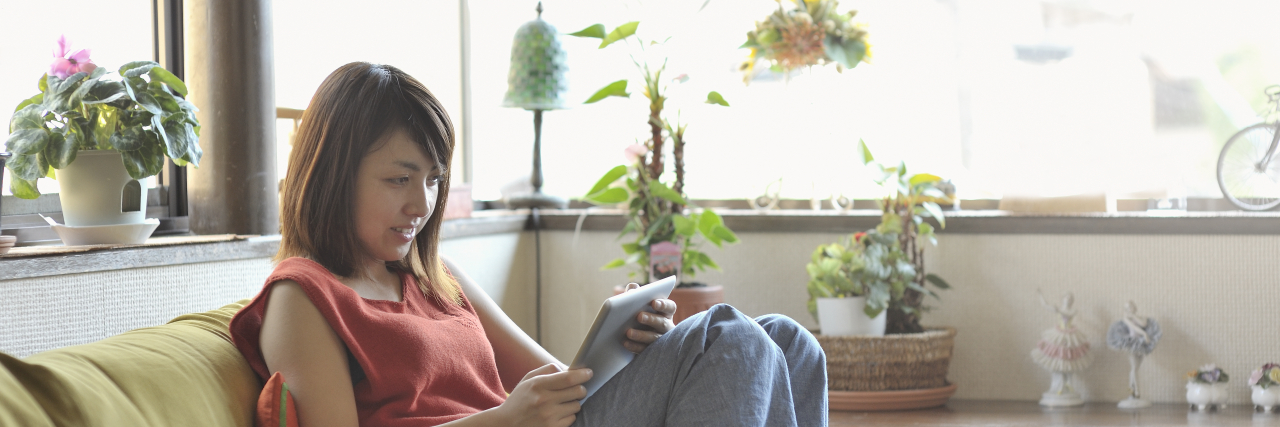Why Assessing My Screen Time Is Complicated as a Disabled Person
Lately, I have been finding myself frustrated with the amount of time and attention I spend on screens. I wake up and immediately pick up my phone. I have my laptop in front of me all day. I watch TV and play video games with my roommates, and by the end of the day, it sometimes feels like I did nothing in the physical world. As I’ve been learning how to effectively use mindfulness, embodiment practices, and acceptance of the present moment, I’ve also been noticing how this much screen time can get in the way of my progress.
On the other hand, as a disabled person who sporadically needs to spend significant amounts of time laying in bed unable to do much of anything, and most often struggles to leave the house at all, the functions we are able to access through screens have felt invaluable. I have been able to find resources to help diagnose and effectively treat my chronic illnesses. I’ve connected with disabled, queer, and social justice-oriented communities that can offer solidarity and even a sense of purpose. I’ve been able to distract myself with entertaining stimulation when the suffering I experience seems unbearable. And all of this while laying flat on my bed. I have to acknowledge the accessibility that is provided to me through screens, and it is still beneficial to me to use those functions at times.
Due to the complexity and fluidity of living with chronic illness, it is unhelpful for me to ask myself, “How much screen time is too much?” or “What screen time schedule would work?” Rather, there are multiple questions I continually ask myself to assess how I’m using my screen time, whether it is truly beneficial, and what I want to be doing with my time.
“What are my daily goals for both screen time and off-screen time?”
If I have no intentions set for outside of screen time, then it becomes much easier to lose the majority of my day to unintentional screen time. I try to get a sense of what I want to accomplish at the beginning of each day, sometimes writing them down or sharing my intentions with others for that added accountability. When I consider what my goals are, including personal responsibilities, self-care, recreation, and socialization, I better realize what I take away from myself with excessive or unintentional screen usage. Though there are definite benefits for me using a screen, there are serious limitations to what I can accomplish, both on and off screens, when I am not acting with awareness of my goals.
“What is the intention or purpose of this screen time?”
If I pick up my phone, open my laptop, or turn on the TV, I consider what my intention is. If I want to look something up, connect socially, work on a task, or do something fun, I acknowledge my intention and act with awareness of that purpose. If I have no intentions, I acknowledge this as well, and then I choose whether to spend my time on unintentional screen time or engage in an off-screen activity. Asking this question isn’t a judgment, but an assessment to allow me to make an informed decision on how to spend my time.
“Am I using screen time with awareness, or am I being sucked into mindless consumption?”
When actively using a screen, it is good to check in with myself about whether I am still acting with awareness and intention. Too many places online and on screens are specifically designed to keep us using their product or function, whether it’s social media, the news, streaming, games, or anything else. Checking in with myself helps me stay on track when I have decided screen time is effective, helpful, or simply desirable. I sometimes use timers or alarms to remind me to check in, and to switch gears if there are other needs or wants to be met. Other times, I am able to bring awareness into these moments without those reminders.
As I move towards a more focused and aware approach to my screen usage, I am already noticing positive changes. I am much less overwhelmed in general. With less social media presence, I feel more present in my in-person conversations. Now that I’m watching movies and shows less often, I find myself looking forward to it rather than scrolling through endless options unable to find anything to enjoy. It’s become easier to take those moments of pause and reflection throughout the day, even without reminders. I’m feeling more curious, more invested in improving my physical space, and more connected to the natural world around me. Overall, I feel better mentally, emotionally, and physically when both using screens less and with more intention.
Of course, we all benefit from the various functions behind screens in many diverse ways, especially those of us with disabilities. While I have found less screen time helpful, there may be those who benefit from more awareness around screen time, and not necessarily less. It is my hope that these questions can be used to assess and increase the effectiveness of screen usage in one’s life, rather than simply limit it.
Getty image by Yagi Studio.

